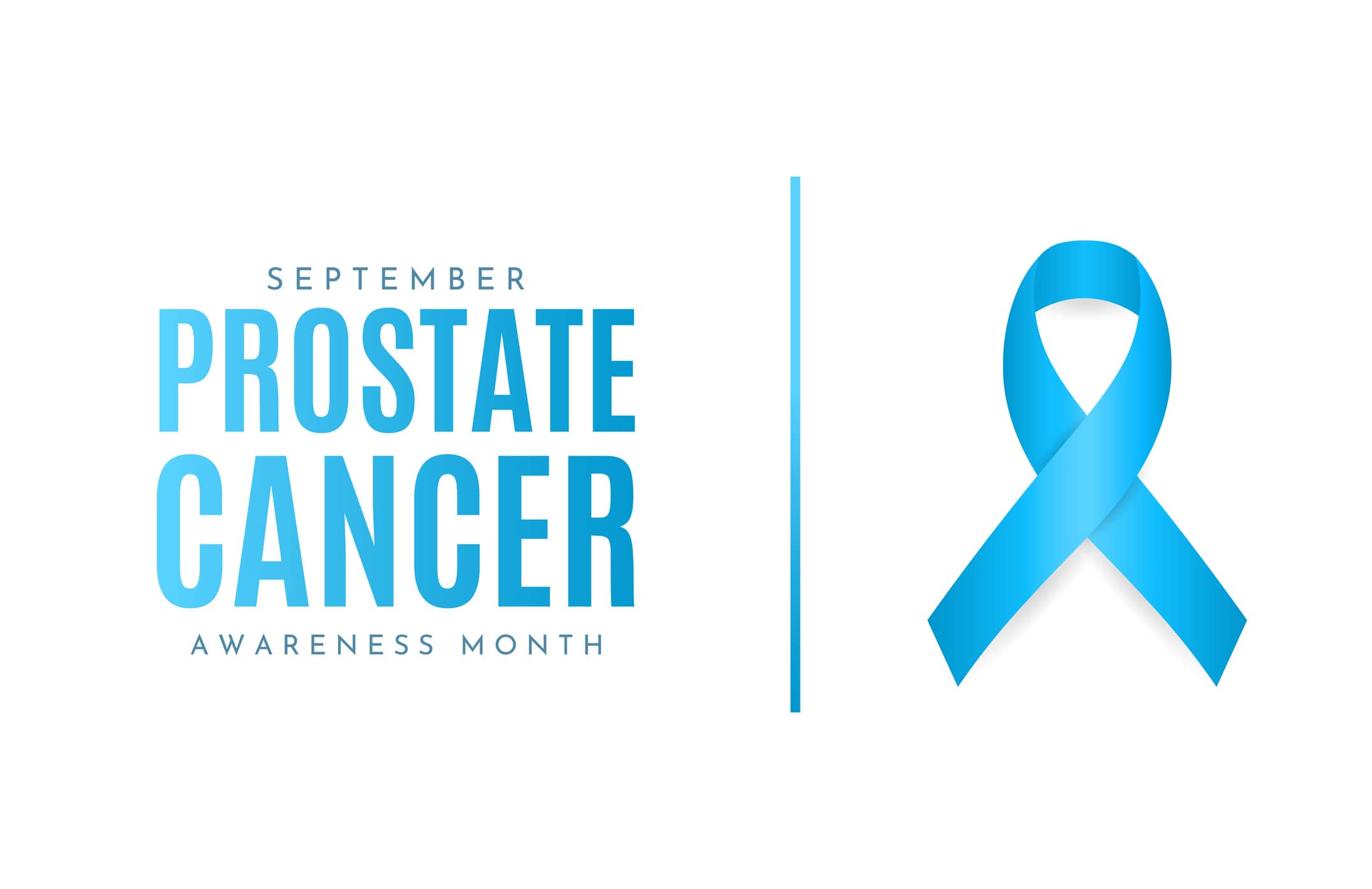Prostate Health Month
Prostate Cancer Awareness Month

September is Prostate Cancer Awareness Month. Why is awareness of prostate health so important? It is important to understand how prevention, early detection, and treatment can help improve the survival rate of this disease, which is currently the second leading cause of cancer death for men in the United States. According to the latest data, more than 288,000 men in the United States are diagnosed each year, and nearly 35,000 of them die. Understanding the warning signs and risks is vital, and so is being proactive about screening, especially if you are in a high risk group.
Understanding Your Risks
All men are at risk for prostate cancer, but some groups are at a higher risk than others. People of African ancestry have a 70 percent higher risk than other groups, and older men are at a higher risk than younger men. A family history of cancer increases your risk, and it is not just prostate cancer in a male relative. The risk is also increased by a family history of breast cancer, particularly in a sister or mother. While these factors cannot be modified, there are certain risk factors that can be changed, like smoking and a sedentary lifestyle.
Screening for Prostate Cancer
With early detection, the odds of surviving prostate cancer are high. Warning signs for this disease include difficulty with urination and sometimes pain in the hips or back. However, many people with prostate cancer experience no symptoms, but are diagnosed after a biopsy is ordered because of an abnormal blood test. This blood test, screening for a marker called prostate-specific antigen (PSA). There is evidence that regular PSA screening can reduce mortality from prostate cancer. It is recommended that men begin getting screened for prostate cancer at age 50, or at 45 if they are in a higher than average risk category.
Treating Prostate Cancer
Fortunately, there are effective treatments for prostate cancer, particularly if it is caught early, when it is still confined to the prostate. Surgery and some forms of radiation are used to treat prostate cancer, and for aggressive prostate cancer, additional therapies area used. These therapies include those that target hormonal pathways, as well as chemotherapy, immunotherapy, and radiopharmaceutical therapies. Many new therapies have been developed over the past decade, and more are in the works.
Decreasing Your Prostate Cancer Risk
There are certain lifestyle modifications you can make to lower your risk of developing prostate cancer.
- Stop smoking. Smoking and using tobacco are bad for every part of your body, and they increase the risk of prostate cancer.
- Eat a nutritious diet. Aim for five servings of fruits and vegetables each day, focusing on eating colorful produce. Choose whole grains, and limit your consumption of red meat and processed meats, instead choosing fish, skinless poultry, beans, and eggs as your protein sources. Eat healthful fats like olive oil, avocados, and nuts. Limit your sugar intake, and cut down on salt.
- Get regular exercise. There is extensive research to indicate that staying active reduces the risk not only of prostate cancer but also heart disease, stroke, and certain other cancers.
- Ask your doctor about screenings. Particularly if you feel that you fall into a high-risk category, it is important to be proactive.
Trust Center for Vasectomy Reversal for Help Maintaining Your Reproductive Health
At the Center for Vasectomy Reversal, we pride ourselves on helping men improve their fertility through uncompromising, concierge-level patient care. Under the direction of Dr. Joshua Green, our team provides state-of-the-art treatment for men who need a reversal of their vasectomy or have other fertility concerns. To learn more about the work we do or our discounts for active duty military and veterans, contact us through our website or call 941-894-6428.
Recent Posts
Popular Posts
categories
- Uncategorized
- Sperm Retrieval
- vasectomy reversal
- Emergency
- Dr. Green
- sperm count
- fertility
- male infertility
- MESA
- medical care
- low sperm count
- IVF
- male fertility testing
- anesthesia
- pregnancy
- sperm aspiration
- semen analysis
- post-vasectomy pain syndrome
- infertility
- VE
- anti-sperm antibodies
- older dad
- general anesthesia
- gender reveal party
- post-operative infections
- baby name
- parent
- baby's first year
- fertilization process
- spinal anesthesia
- ACS Fellow
- nutrition tips
- concierge-level care
- fertility planning app
- azoospermia
- out-of-town patients
- V-V
- post-vasectomy reversal
- conceiving
- vasectomy
- vasoepididymostomy
- smoking
- sperm quality
- baby registry
- infographic
- surgical care
- surgical consultation process
- prostate cancer
- baby gender
- family time
- COVID
- Baby Shower
- Child Care
- Halloween Costume Ideas for Babies
- Halloween
- Halloween Safety Tips
- Celebrity Infertility Spotlight
- Postpartum
- testosterone
- Father's Day
- Father
- Men's Health
- Thanksgiving
- Pregnancy Announcement
- Parenting Tips
- Sperm
